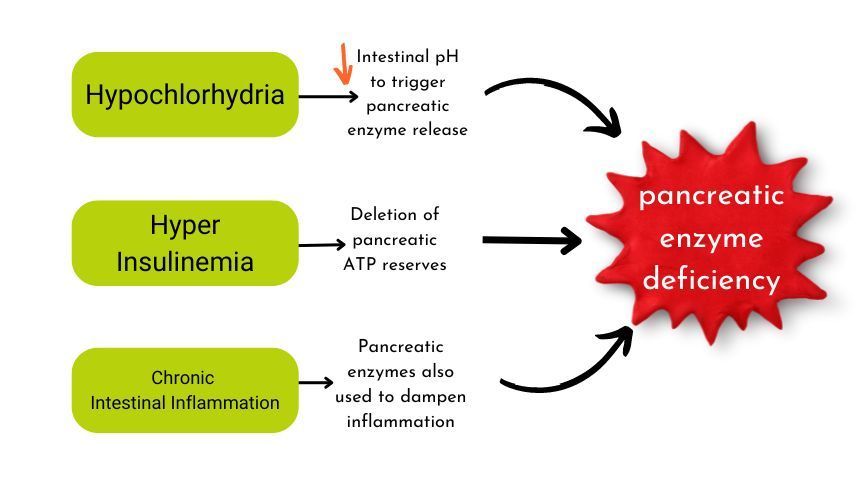Unraveling the Complexities of Pancreatic Enzyme Deficiency
Pancreatic enzyme deficiency, now formally recognized as pancreatic exocrine insufficiency, has emerged as a notable health issue, marked by the body's incapacity to produce adequate pancreatic enzymes for digestion.
Pancreatic enzyme deficiency can manifest in various symptoms, including:
- Digestive discomfort: Individuals may experience abdominal pain, cramping, or discomfort, particularly after meals.
- Difficulty digesting certain foods: There may be challenges in digesting high-fiber or fatty foods, leading to bloating, gas, and indigestion.
- Floating stools: Stools may appear bulky, greasy, and float in the toilet due to inadequate digestion and absorption of fats.
- Nutrient deficiencies: Malabsorption of nutrients, particularly fat-soluble vitamins like A, D, E, and K, can lead to deficiencies and related health issues.
- Weight loss: Inadequate absorption of nutrients can result in unintended weight loss or difficulty maintaining a healthy weight.
- Chronic diarrhea or loose stools: Poor digestion and absorption of nutrients may lead to frequent or chronic diarrhea and loose stools.
- Weakness and fatigue: Nutrient deficiencies and digestive issues can contribute to overall weakness, fatigue, and a lack of energy.
- Foul-smelling stools: Unabsorbed fats can cause stools to have a strong, foul odor.
Overall this deficiency presents an array of symptoms, from digestive distress to compromised nutrient absorption, warranting closer attention and proactive management.
Identifying pancreatic enzyme deficiency entails keen observation of subtle indicators, such as struggles with roughage and fiber digestion, coupled with persistent discomfort in the left ribcage post-meals. Addressing this deficiency typically involves supplementation with pancreatic enzymes, offering relief from symptoms like floating stools, indigestion, and bloating. It also begs the question WHY? Because knowing why is the at the heart of functional nutrition therapy, it's also where the fix is.
Understanding the underlying causes of pancreatic enzyme deficiency is pivotal for effective treatment.
Three primary factors contribute to its onset:
1. Hypochlorhydria: Beginning with a "north to south" approach, rectifying low stomach acid levels often resolves pancreatic enzyme deficiency. By optimizing gastric acid production, the digestive process can regain efficiency, potentially reducing the reliance on enzyme supplements.
2. Chronic hyperinsulinemia: Prolonged fluctuations in blood sugar levels and recurrent insulin surges can strain the pancreas, culminating in enzyme deficiencies. Managing conditions such as diabetes and metabolic syndrome can alleviate this strain on pancreatic function, potentially obviating the need for enzyme supplementation.
3. Gut inflammation: Inflammatory processes in the gastrointestinal tract may prompt the release of pancreatic enzymes as a protective measure. Chronic inflammatory disorders, including intestinal autoimmune conditions or infections, may necessitate ongoing enzyme supplementation to manage inflammation and uphold digestive well-being.

However, it's crucial to recognize that relying solely on pancreatic enzymes for life is not a sustainable solution. Addressing the root causes of pancreatic enzyme deficiency through holistic interventions is imperative. By identifying and remedying factors like hypochlorhydria, chronic hyperinsulinemia, and gut inflammation, healthcare providers can foster optimal pancreatic function and alleviate the associated symptoms.
In conclusion, comprehending the intricacies of pancreatic enzyme deficiency sheds light on its significance in digestive health and overall wellness. By unraveling the underlying contributors to this condition and implementing targeted interventions, individuals can find relief from digestive discomfort and enhance their quality of life.
Interested in getting a comprehensive assessment of your digestive health? Let's take a functional "north to south" approach to explore and address any issues you may be experiencing. Sign up for a free discovery session to learn more about my process and how it can benefit you. Reach out today to schedule your session and take the first step toward optimizing your digestive well-being!
Don't Miss Out!

Heidi Toy Functional Medicine Blog























































































